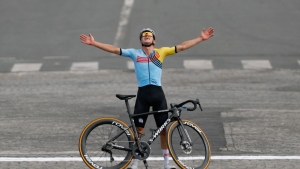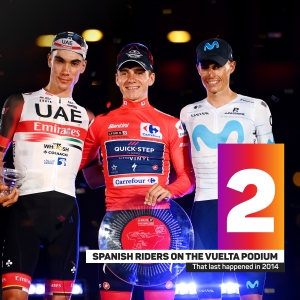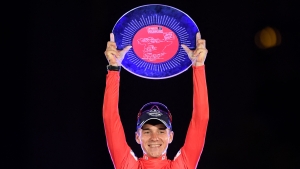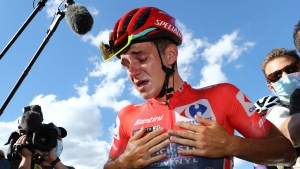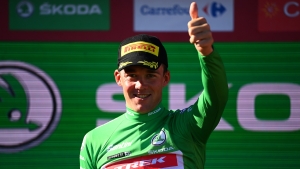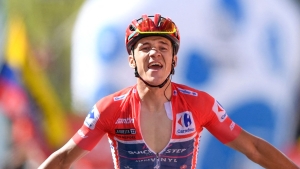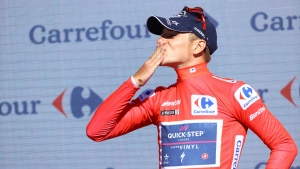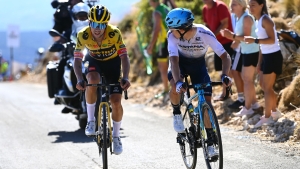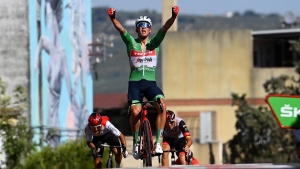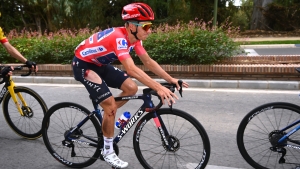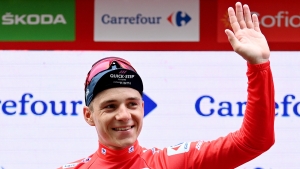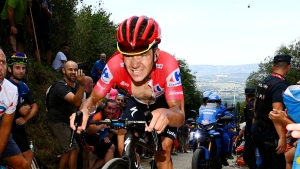Remco Evenepoel rubber-stamped his Vuelta a Espana title on Sunday, safely negotiating the procession into Madrid.
The 22-year-old joins an illustrious list of names from his native Belgium to have won a Grand Tour, albeit his triumph in Spain marks the end of a long drought for the nation.
Evenepoel's success, however, came at the expense of Primoz Roglic's shot at history.
Roglic was hunting an unprecedented fourth straight Vuelta title, and looked set to overtake Evenepoel in the general classification in stage 16, only to suffer a crash 100 metres from the line.
The Slovenian was unable to carry on due to the injuries he sustained and abandoned La Vuelta for the first time in his career. Roglic has had awful luck in recent Grand Tours, having had to abandon three of the last four he has appeared in.
There were 49 withdrawals across this edition of La Vuelta, the highest number since 2013.
But of the riders that did finish, there were plenty of records and statistics to dive into, courtesy of Opta data.
Belgium's long wait is over
Formula One world champion Max Verstappen shrugged off the jeers and boos he received after triumphing at The son of former pro cyclist Patrick Evenepoel, a young Remco actually started his sporting career in football, with one of his old clubs – Dutch giants PSV – among those to offer their congratulations as he became Vuelta champion.
It marks Evenepoel's first Grand Tour crown, in what was his first appearance at La Vuelta. He led the race for a remarkable 16 stages, which is more than any other rider has led it for since two-time champion Chris Froome managed 19 stages in red back in 2017.
Belgium has produced some fantastic riders, not least the great Eddy Merckx, who counts one Vuelta crown among his 11 Grand Tour titles, yet shockingly Evenepoel is the nation's first GT champion since 1978, when Johan de Muynck won the Giro d'Italia.
Evenepoel is the eighth Belgian to win the Vuelta – the first since Freddy Maertens in 1977. Only Spain (32) and France (nine) have produced more Vuelta champions than Belgium (eight).
Out with the old...
Alejandro Valverde won La Vuelta in 2009, but on his farewell appearance at his home Grand Tour, the 42-year-old was never going to compete for top honours.
Instead, this was his goodbye lap, as Valverde completed his 14th Vuelta, matching the record tallies of Federico Etxabe, Chente Garcia Acosta and Inigo Cuesta.
Spain did have a GC contender to cheer on in the form of Movistar's Enric Mas, but after Roglic's crash, he was unable to close the gap on Evenepoel, finishing over two minutes back. No Spaniard has now won it since 2014, which is the longest streak in the race's history without a home champion.
Mas has finished second in three of his four Vuelta appearances, and came in ahead of Juan Ayuso, with two Spanish riders finishing in the top three for the first time since 2014, when Valverde joined champion Alberto Contador on the podium.
Ayuso, who contracted COVID-19 early in the race but carried on, is the youngest rider to achieve a podium finish at La Vuelta (19 years and 360 days). Spain's future seems in good hands.
Carapaz caps personal best, Pedersen a rising star
The red jersey was, of course, not the only one up for grabs. Richard Carapaz and Mads Pedersen both finished with three stage victories to their name.
Carapaz became the first cyclist from the Americas to win the mountain classification since Felix Cardenas of Colombia in 2004, while the INEOS Grenadier rider also marked his best effort at a Grand Tour, surpassing the two stage wins he managed at the 2019 Giro d'Italia.
Vuelta debutant Pedersen, meanwhile, became the first Dane to win the points jersey in any Grand Tour.
It has been a brilliant year for Denmark, with Jonas Vingegaard having claimed the yellow jersey at the Tour de France, and Pedersen is among their best riders. Indeed, the only Dane to have won more stages at La Vuelta than the sprinter is Magnus Cort (six), though the latter has made three appearances in the race.
























